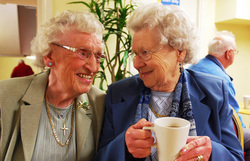This week I am discussing the importance and value of the skill of listening in our role as a friend.
I love the quote of Lord Byron who likens friendship to love without wings.
Being a friend and having friends is a very special relationship.
It is a gift of love that we can both give and receive. So how can listening help us in our special role?
1. What are you hearing?
Listening is difficult. It takes patience, understanding, discernment and practice. Listening takes lots and lots of practice.
“If speaking is silver, then listening is gold”. Turkish proverb.
According to Ralph Nichols the most basic of all human needs is the need to understand and be understood. The best way to understand people is to listen to them. When we are speaking, in particular with our friends, we want and need them to listen to us. Do we actually hear what our friends are saying when they are speaking to us? Or is it the case that we often eagerly rush in, interrupting them with our own views, opinions, comments, judgements or news!
Are we really hearing what they are saying or merely what we thought they said? If we are truly listening we will have a deeper understanding of them, and of their situation. Like all skills, listening takes practice, practice and more practice.
“There is a big difference between showing interest and really taking interest”.
M.P.Nichols (The lost Art of Listening).
Are you hearing what your friend is saying?
2. How do you listen?
We can apply this good advice from Ernest Hemingway. “When people talk, listen completely. Most people never listen”. If there is a lesson in this, then the next step is to become aware of how we listen?
When you are with your friends take heed of their tone of voice and body language, both can speak volumes. Often it is how something is said than what is expressed that conveys the most meaning. These verbal and non verbal clues can give you a more accurate understanding of your friend’s feelings. Being cognizant of these can help you empathise more accurately and effectively.
“One friend, one person who is truly understanding, who takes the trouble to listen to us as we consider a problem, can change our whole outlook on the world”. Dr. E. H. Mayo
3. Time to listen.
“It’s the friends you can call up at 4 a.m. that matter”. Marlene Dietrich
Do you make time for your friends? And do your friends make time for you? To have good friends, you must also be a good friend, that means taking time, making time for them in your life. Or is it a case that friends only appear when they want or need something? “You reap what you sow”.
Like a garden, you must plant the seeds of friendship; nourish them with your presence, and that means being present and involved. Then you look forward to enjoying the rewards of your efforts as they yield colour, abundance, joy and love in your life.
“Go often to the house of thy friend, for weeds choke the unused path”. R.W. Emerson.
This week enjoy the gift of friendship.
Mary Jo xx
I love the quote of Lord Byron who likens friendship to love without wings.
Being a friend and having friends is a very special relationship.
It is a gift of love that we can both give and receive. So how can listening help us in our special role?
1. What are you hearing?
Listening is difficult. It takes patience, understanding, discernment and practice. Listening takes lots and lots of practice.
“If speaking is silver, then listening is gold”. Turkish proverb.
According to Ralph Nichols the most basic of all human needs is the need to understand and be understood. The best way to understand people is to listen to them. When we are speaking, in particular with our friends, we want and need them to listen to us. Do we actually hear what our friends are saying when they are speaking to us? Or is it the case that we often eagerly rush in, interrupting them with our own views, opinions, comments, judgements or news!
Are we really hearing what they are saying or merely what we thought they said? If we are truly listening we will have a deeper understanding of them, and of their situation. Like all skills, listening takes practice, practice and more practice.
“There is a big difference between showing interest and really taking interest”.
M.P.Nichols (The lost Art of Listening).
Are you hearing what your friend is saying?
2. How do you listen?
We can apply this good advice from Ernest Hemingway. “When people talk, listen completely. Most people never listen”. If there is a lesson in this, then the next step is to become aware of how we listen?
When you are with your friends take heed of their tone of voice and body language, both can speak volumes. Often it is how something is said than what is expressed that conveys the most meaning. These verbal and non verbal clues can give you a more accurate understanding of your friend’s feelings. Being cognizant of these can help you empathise more accurately and effectively.
“One friend, one person who is truly understanding, who takes the trouble to listen to us as we consider a problem, can change our whole outlook on the world”. Dr. E. H. Mayo
3. Time to listen.
“It’s the friends you can call up at 4 a.m. that matter”. Marlene Dietrich
Do you make time for your friends? And do your friends make time for you? To have good friends, you must also be a good friend, that means taking time, making time for them in your life. Or is it a case that friends only appear when they want or need something? “You reap what you sow”.
Like a garden, you must plant the seeds of friendship; nourish them with your presence, and that means being present and involved. Then you look forward to enjoying the rewards of your efforts as they yield colour, abundance, joy and love in your life.
“Go often to the house of thy friend, for weeds choke the unused path”. R.W. Emerson.
This week enjoy the gift of friendship.
Mary Jo xx


 RSS Feed
RSS Feed

